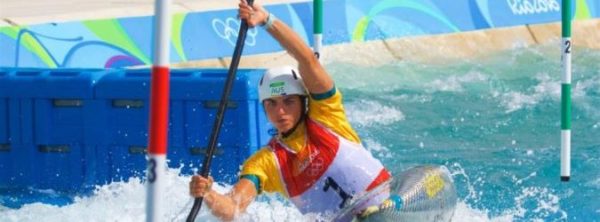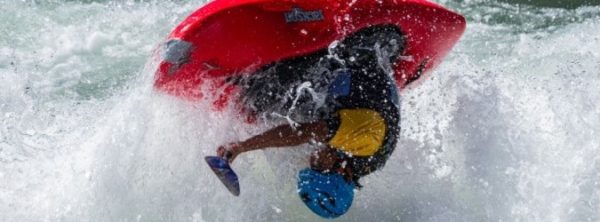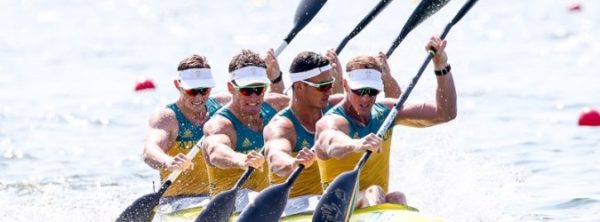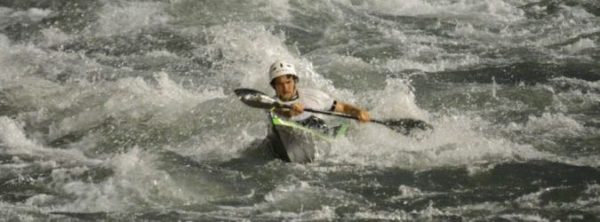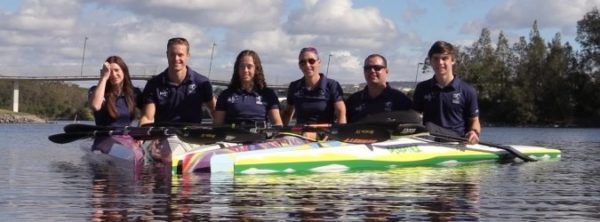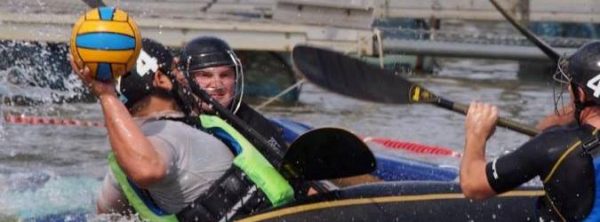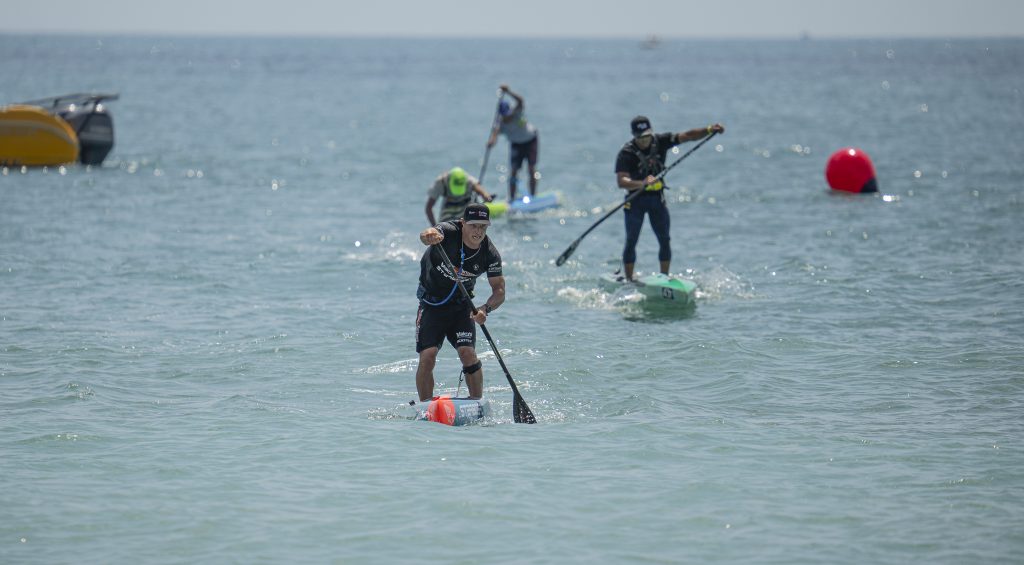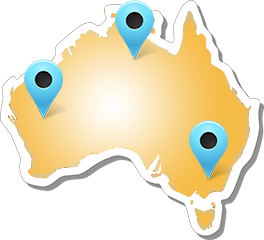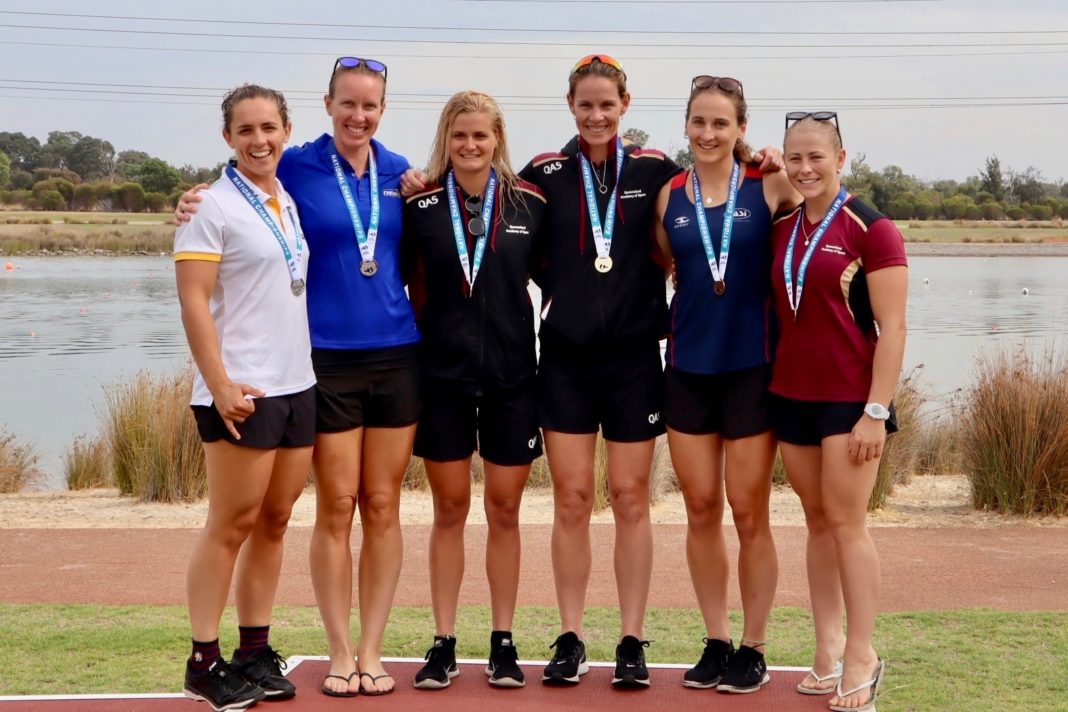Paddle Australia’s women sprint paddlers led the charge on day three of the Canoe Sprint National Championships at Champion Lakes with Rio Olympians Alyce Burnett (QLD) and Alyssa Bull (QLD) adding another gold in the women’s K2 500 to their list of two gold (Burnett, WK1 500 and 200) and one silver medal (Alyssa Bull, WK 1 500) at the 2019 national titles.
2018 World Championships K4 team mates Jo Brigden-Jones (NSW) and Western Australian Jaime Roberts were right on their heels to secure silver with only +0.27 seconds separating the two boats and with both teams securing automatic selection to this year’s senior team. U23 paddler Brianna Massieteamed up with South Australia’s 2018 national team paddler Cat McArthurto complete the podium in third.
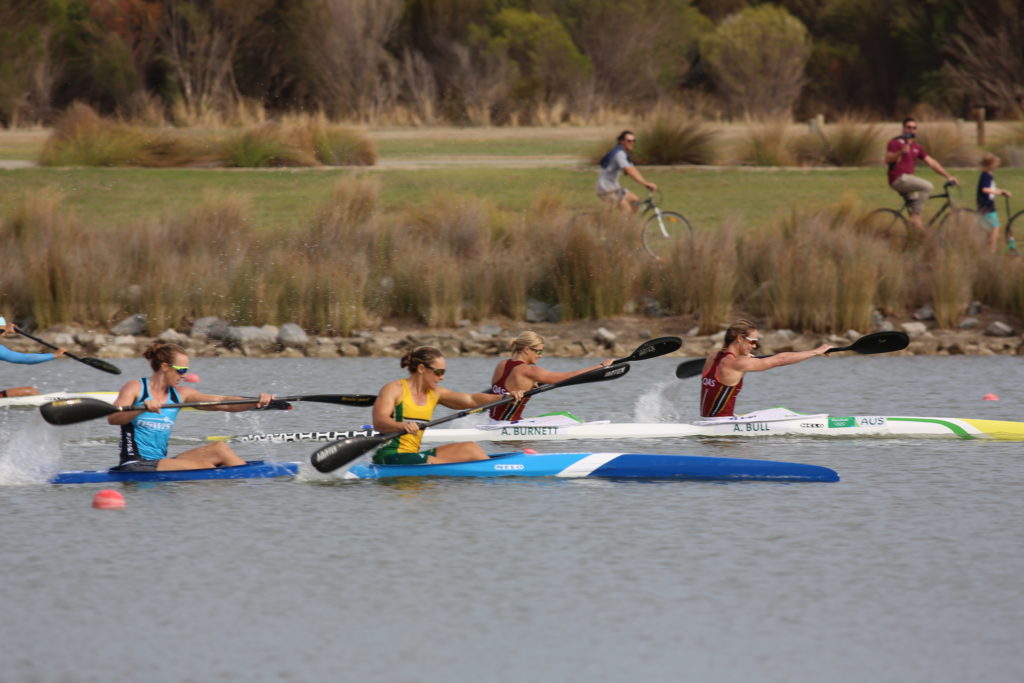
Brigden-Jones and Jaime Roberts continued on in the women’s K2 200 heat and progressed straight through to Saturday’s final together with Ella Beere(NSW) and Shannon Reynolds (WA) after a dead heat between the two boats in a time of 0:38.85. The other heat was won by Yale Steinepreis(WA) and Brianna Massie (QLD) in 0:39.11.
“We have a big emphasis on performance standards to qualify for teams this year and everyone is really pushing those times down, so it’s really driving the whole group up and it’s a good atmosphere that we’ve got at the moment,” Alyssa Bull said about the quality across the women’s squad.
Bull finished second in Friday’s WK1 500 with both Burnett and her posting a fast time of 1:49.16 and 1:49.99 respectively.
“All the girls are paddling the K1 really fast, especially AB (Alyce Burnett) here and it’s so good to be under the 1:50 with her, even though it was only just,” Bull added about the K1 racing across the squad.
“We’ve got a really good group of girls coming through. I mean Kailey Harlen, a junior paddler making the senior final yesterday in the open women’s K1 500 is huge, I could have only wished for that when I was her age.”
“And we got Ella (Beere) coming through and you’ve got Shannon (Reynolds) pushing as well and Brianna (Massie) and Yale (Steinepreis), so there’s lots of different names coming up and I think it’s very exciting not only for Tokyo but for Paris after that. I don’t know if I will still be around then, who knows, but I know whoever will be going around will be pushing those internationals,” Burnett said about the calibre of the up and coming talent.
Junior paddler Kailey Harlen (NSW) continued to impress on day three of the event after taking out the national title in the women’s K1 18 500 in a time of 1:58.52 and +5.21 seconds ahead of second placed Alicia Fay (QLD) and Yasemin Ray (WA).

Kailey Harlen – Photo Susan Hughes
Fittingly for International Women’s Day, the 17-year old, who switched from football to canoeing, loves the sport she is now excelling in because of its equal playing field and the strength of the women’s squad around her.
“I came from soccer, which was a very male dominated sport. Coming here it’s a very equal playing field and that’s what I love about the sport. You are amongst everyone, we are all racing at the same time and everyone is there watching each other and it’s a good vibe. And me racing in the open’s is also a great thing to see how women are coming along.”
Paddle Australia’s female paralympic medallists Susan Seipel (QLD) and Amanda Reynolds (VIC) also continued to build on their performances over the last couple of days and posted strong results in the 1000 events on the last day of the paracanoe-events at the national titles.
Both paddlers added a win in the PCK1 1000 to their list of national titles after winning the K1 200 and 500. Both Seipel and Reynolds race in different para-canoe classifications on the international level, but used the national titles to better their previous best times.
“You just got to focus on your own race and go up against yourself and your previous best time. Last time they had nationals here in Perth we had great conditions and I did a lot of PBs then, so I was excited to come back here and try to beat my PBs on the same course,” Susan Seipel explained.
“It’s all been going really well and I got a PB in the 500 in the kayak so I was happy with that. In the 200 I was one second off a PB in my kayak, so I was pretty happy overall,” Seipel wrapped up the event with national team squads to be announced later next week.

Susan Seipel – Photo Susan Hughes
Paralympic champion and eight-times world champion Curtis McGrath (QLD) as well as Paralympian Dylan Littlehales (NSW) also managed to set new PBs at the national titles with McGrath enjoying the rivalry on home waters, before racing in different classifications again on the international circuit.
“Little Dylan Littlehales is flying at the moment and he cracked out a sub-40 seconds in his 200 and he’s the one to beat at the moment in the para-squad for Australia and it’s nice to have that competition, that rivalry. He’s finally starting to work hard in the gym and getting stronger and fitter and it’s nice to have someone to chase now. It’s good having that rivalry and it’s pushing me along,” McGrath said about his 19-year old training partner.
“Racing at nationals 2019 here has been going really well and we’ve had some really fast times despite the lack of the Freo doctor we hope for when we come here. I’m really happy with my times and I went a little bit faster than my world’s time in the 200 and so far my 500 and 1000 times have been pretty good too. It’s been good racing and it’s been nice that we’ve had a good turn-out for the para-squad, with numbers growth. Everything is moving along and we see some talent coming through,” McGrath added after winning all events in his classification (PC MK1 200, 500, 1000, MV1 200) and with the men’s para-canoe events seeing full fields with developing work continuing around the country.

Curtis McGrath – Photo Susan Hughes
Talent is also coming through in the Olympic men’s classes with the youngest paddler in the men’s K1 500 A final, Tom Green (QLD), taking out the win in the men’s K1 500 (1:38.17) after also winning the heat and semi-final and securing automatic national team selection as a consequence.
“It was a very good race, one of my better ones and I was actually really stoked to come away with that result and with that kind of lead. I was a bit nervous with that head-cross wind and I also hurt a lot more than I expected to,” the 19-year old said after the race which he won +1.93 seconds ahead of twenty-year old Jean van der Westhuyzen(1:40.10) and Rio Olympian Jordan Woodin third (1:40.38)
Green, who won the 2018 U23 World Championships in the K2 1000 together with fellow Queenslander Joel McKitterick, also made his first Senior team last year where he finished eighthin the men’s K1 500 and placed fourth in the men’s K4.

Tom Green – Photo Susan Hughes
“We have a really good squad of young guys at the moment with all of us in their early to twenties. I had a look at the program before I raced and it was Kenny Wallace and this A-grade bunch of guys and it was good to line up with those boys.”
“Kenny has been a very big role model in my entire career, even when I was one of the younger competitors and I wasn’t in QAS or anything like that and I would always look up to him. Fortunately, enough, when I have been training with him, he’s been giving me a lot of guidance and he helped me to where I am and helped me learn from things I wouldn’t pick up on.”

Kenny Wallace – Photo Susan Hughes
While Green is naming 2008 Olympic champion and 2016 Olympic bronze medallist Kenny Wallace, who placed eighth in the final, as his role model, it’s the Junior paddlers, who now name Green as their role model.
“I haven’t really realised that others might think of me as a role model as well. I think I’m still a big little kid, but it’s nice to hear that. That’s inspiration.”
“It’s good to see someone like Tom Green come straight out of Juniors and do so well already. It makes the jump from Juniors to Senior look more achievable,” under 18 paddler Jesse Kneebone-Ellis (SA) said after winning the men’s K2 500 18 and securing his third Junior team selection together with his West Lakes club mate Dan Kucharski, who is also inspired by Tom Green’s performance.
“Tom Green just smashed it today. It’s very motivational to see that people who put in the hard yards get something out of it and get good results like what Tom Green has just done.”

Kneebone-Ellis – Kucharski – Photo Susan Hughes
Kneebone-Ellis and Kucharski already won the men’s K2 200 18 and are aiming for the trifecta in Saturday’s men’s K2 1000 18.
Green also won the heat and semi-final in the men’s K1 1000 and is a hot contender for tomorrow’s final.
Day three of the National Sprint Championships also saw Australia’s master’s paddlers take to the water with the women’s masters athletes showing the younger crews on International Women’s Day that sprinting is a sport for all ages. Erica McKnight beat other Ascotians to the line in 4:58.68 while in the oldest ages group of M65+ fellow Ascot club member Ron Clark, raced across the line in 4:48.00.
In a full field of local M55+, Mandurah Ocean Club’s David Bergland stormed the field coming home in 4:26.54, to be well clear of his next competitor.

Sydney Northern Beaches’ Mario Vesely, who has also raced in the open events this week, was tipped to be the winner in the 45+, but was beaten by local boy Brett McDonald from Ascot in 3:55.67. Daniel Humble (WA, Indian Ocean) blitzed the M35+ to take the win in 3:50.35 which would have earned him a place in the open semi-final.
The M55+ K2 200 was a tight race between local WA clubs and the sole entrant from over east Peter McIntyre and Paul Hutchinson (NSW). K1 1000 winner David Berglund teamed up with Chris Boocock for another national championship title in 0:42.38.
Avoca’s McIntyre and Hutchinson got their revenge in the M45+ K4 200, teaming with Mario Vesely and West Australian Phill Langley for the most hotly contested race in the masters, winning the title by a mere 0.20 seconds in a time of 0:38.90
Racing continues on the penultimate day of the regatta on Saturday, 9 March 2019.
About the 2019 Paddle Australia Canoe Sprint National Championships
Western Australia’s Champion Lakes in Perth is hosting a stellar line-up of current Olympic and Paralympic champions as well as Australia’s future canoe sprint champions who are battling it out for national titles as well as national team honours at the 2019 Paddle Australia Canoe Sprint National Championships this week (6-10 March 2019)
16 months out from the Tokyo 2020 Olympic and Paralympic Games the National Championships have attracted over 220 athletes with the event also the final domestic national team selection event for both Olympic and Paralympic class paddlers to contest the upcoming international ICF Canoe Sprint and Paracanoe World Cup season.
The ultimate goal for Australia’s sprint paddlers this season will be securing of Olympic and Paralympic quota places at the international season’s highlight, the 2019 ICF Canoe Sprint and Paracanoe World Championships in Szeged, Hungary at the end of August.
All of Paddle Australia’s 2018 Olympic and Paralympic classes national team athletes are contesting at the national championships, aiming to secure their 2019 national team spots.
The National Championships is also the final selection event for the spots on this year’s Junior and Under 23 Teams.
228 athletes are contesting the 297 events across all age groups from as young as under 10 years old to over 65 years of age over the five-day regatta.
Racing at Champion Lakes Regatta Centre in Perth runs from Wednesday, 6 March local time and will conclude at 1:15 p.m. on Sunday, 10 March 2019.
Follow mobile live results here: http://bit.ly/SprintNationalsResults19
See all event information, including entries here: https://sprint.paddle.org.au/nationals/






